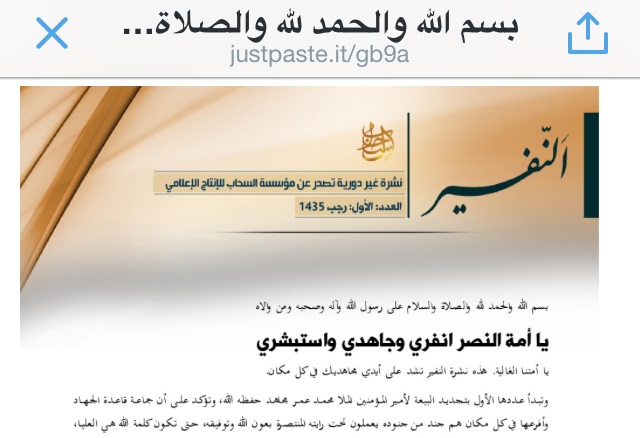ANALYSIS: AL-QA’IDA RENEWS ITS ALLEGIANCE TO MULLAH OMAR
ANALYSIS: AL-QA’IDA RENEWS ITS ALLEGIANCE TO MULLAH OMAR
By Michael S. Smith II
We and al-Qa’ida are as one. If we are preparing attacks, then it is likewise the work of al-Qa’ida, and if al-Qa’ida is doing so, then this is also our project.*
—Mullah Dadullah (2007)
There are those who claim that al-Qa’ida works separately from the Taliban. This is a lie and a false accusation. On the contrary, we and the Taliban are inseparable and are a single entity … our commander Sheikh Usama has pledged allegiance to the Commander of the Faithful Mullah Mohamed Omar and the Muslims are as one against those other than them.*
—Abu al-Hasan (2008)
How can anyone accusing us of claiming to be the caliphs of Muslims forget that we have pledged allegiance to the Emir of the Believers Mullah Mohamed Omar Mujahid, may God protect him, and that he is the emir of the Islamic Emirate of Afghanistan.
—Ayman al-Zawahiri (2013)
On 20 July 2014, al-Qa’ida’s official media wing, as-Sahab, announced the launch of a new publication. Titled al-Nafir, while the name of this new Arabic-language bulletin may be translated in a number of ways, as used by al-Qa’ida, this term is likely best translated as “a call to arms,” as sounded on battlefields of old by a horn. Indeed, the author(s) of this first issue clearly aspire to reenergize al-Qa’ida members’ aspirations to reestablish a caliphate spanning from North Africa to Indonesia. Yet although al-Qa’ida is continuing to signal it does not regard the Islamic State’s declaration of a caliphate to be valid, signs abound that al-Qa’ida’s senior leaders will defer to Afghan Taliban leader Mullah Mohamed Omar on the matter of how to go about managing the rift in the Global Jihad movement generated by Abu Bakr al-Baghdadi’s power plays.
Another Signal to the Islamic State
In the opening of this first issue of al-Nafir, the question of al-Qa’ida’s position regarding the Islamic State’s declaration of a caliphate is addressed with the following text: “We begin with the first issue to renew the pledge of bayat to the emir of the faithful Mullah Mohamed Omar Mujahid …”
It is almost certainly the case that this renewed pledge of allegiance to Mullah Omar has been issued to signify al-Qa’ida’s rejection of the Islamic State’s claim that it has established a caliphate, and, with it, the Islamic State’s assertion that its establishment of a caliphate serves to nullify all pledges of bayat made to leaders of other groups — the members of which, according to IS’s demands, should pledge their loyalty to Caliph Ibrahim (previously known to his subordinates in ISIS as Abu Bakr al-Baghdadi). However, this statement also serves to indicate that, as far as al-Qa’ida’s leaders are concerned, it is Omar who will ultimately determine if the Islamic State’s claim is valid.
This statement is but the latest reminder that al-Qa’ida’s emirs have pledged their loyalty to the so-called “Emir al-Mu’minin,” Afghan Taliban leader Mullah Mohamed Omar, and that al-Qa’ida is thereby subordinated to him. Soon after IS announced the establishment of its so-called caliphate spanning areas of Iraq and Syria, as-Sahab released a video of al-Qa’ida founding emir Usama bin Laden pledging bayat to Mullah Omar.
Meanwhile, inasmuch as al-Qa’ida’s actual position on this matter has thus far been left to interpretation, so too has the matter of just who in the Global Jihad movement will issue the definitive reply to the Islamic State’s claims. That is, as far as al-Qa’ida is concerned.
Mullah Omar: The hidden helmsman of the Global Jihad movement?
As implied by the contents of this new publication, al-Qa’ida’s leadership is apparently not inclined to accept Abu Bakr al-Baghdadi’s claim to the title of caliph. Nor do they wish to subordinate themselves and their international network of jihadis to him, as demanded by IS. Concurrently, as al-Qa’ida’s senior leaders have subordinated themselves and their organization to Mullah Omar, it seems likely that Omar’s perceptions of the Islamic State’s declaration of a caliphate will matter more to the Global Jihad movement than the perceptions of al-Qa’ida’s shura members, as well as the perceptions of al-Qa’ida emir Ayman al-Zawahiri.
Although quick to proclaim the recent exchange of an American hostage held by members of the Haqqani Network for five Talibs held by the US constituted a victory for the Taliban, during the past 20 days Omar has been silent in response to the Islamic State’s declaration of a caliphate.
Interestingly, so too has al-Qa’ida’s infamously verbose emir.
The obvious question is: Why?
This question inevitably prompts more questions for analysts of the Global Jihad movement than firm answers. Among these questions are the following:
Is Omar perhaps inclined to accept as valid the Islamic State’s declaration of a caliphate, but reserving judgment until al-Qa’ida’s shura has had an opportunity to present the case for why he should not validate this claim?
Is al-Zawahiri awaiting input from Omar before issuing a formal reply to the Islamic State’s claim?
Or might they be preparing to issue a joint statement?
Or might Omar and al-Zawahiri be rejecting the claim by simply refusing to acknowledge it, with the eventual emergence of a new al-Qa’ida emir in Iraq serving to provide a fuller clarification of their position?
Yet perhaps the most significant questions are:
Is Ayman al-Zawahiri really just a vocal cutout for the true leader of the Global Jihad movement?
Indeed, if Mullah Mohamed Omar is regarded by al-Qa’ida’s leadership as the top-ranking decision maker in the Global Jihad movement, why isn’t his organization, the Afghan Taliban, designated a Foreign Terrorist Organization by the US?
For additional coverage of al-Nafir, see this report by Thomas Joscelyn at The Long War Journal.
*Referenced in “Core al-Qa’ida in 2008: A Review” by Ronald Sandee.




